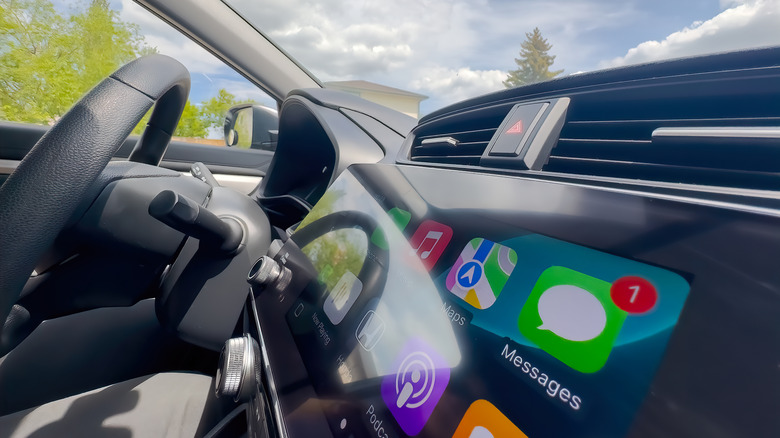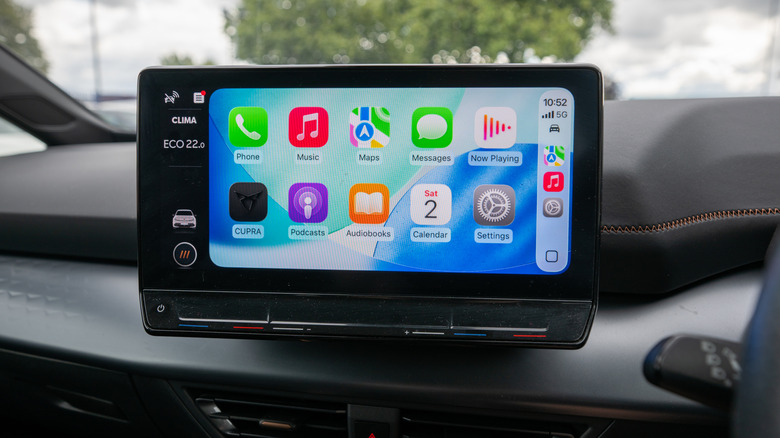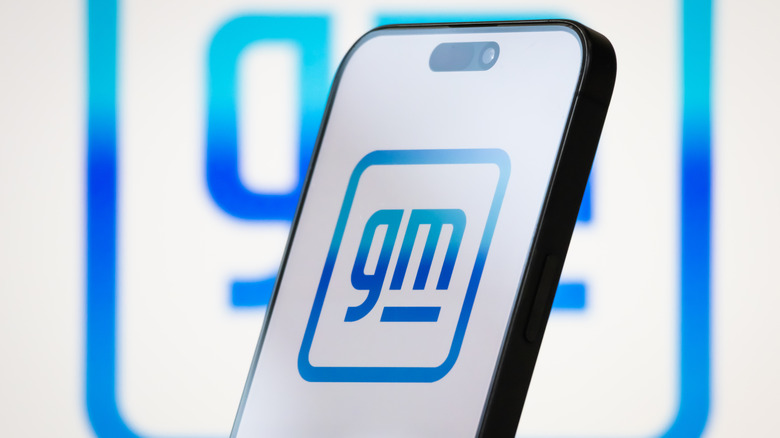Sorry, GM - Apple's CarPlay Isn't Going Anywhere
Back in 2023, General Motors announced plans to start phasing out Apple CarPlay compatibility from its electric vehicles, a strategy that has since expanded to include gas-powered vehicles as well. GM's decision regarding CarPlay, and Android Auto for that matter, has been derided by many as anti-consumer. The rationale behind GM's peculiar decision is that the company wants users to use its own infotainment system so it can then charge them for data plans and subscription-based access to helpful navigation features.
In the wake of GM's plan to eliminate CarPlay compatibility across the board, The Atlantic writes that the "glory days of CarPlay may be numbered." The crux of the argument is that automakers can make a lot more money by offering their own infotainment options. While GM is currently the only major manufacturer with plans to discontinue CarPlay support, the article claims that other auto manufacturers following suit is not a matter of if, but when.
The reality, though, is that GM is sacrificing usability for short-term profits. Users love CarPlay and many individuals who rely on the seamless integration of their iPhone and their vehicle will likely steer clear of GM vehicles as a result.
GM's infotainment system offers users a subpar user experience
GM may couch its infotainment strategy as being in the best interest of users, but it's really a play for more control and ultimately more revenue. Consequently, GM users will be forced to endure a subpar user experience because — if we're being honest — GM's infotainment system leaves a lot to be desired. A MotorTrend review of the 2024 Chevy Silverado, for example, noted that the built-in infotainment system was prone to freezing and would often disconnect from GPS at random moments. What's more, access to the full range of infotainment features costs $24.99 per month.
"Choosing not to pay for OnStar will result in the loss of access to certain features," the review noted. "These include the Google Play app store, Google Assistant, and, most alarming, Google Maps. That's right—without a paid subscription, our $75,000 2024 Chevy Silverado ZR2 doesn't offer access to its native navigation system."
Further, Reddit and other online forums are filled to the brim with users complaining about GM's infotainment system. One particularly frustrating problem users have complained about is that audio connectivity can stop working at any moment. Speaking to the scope of the problem, GM Authority notes that GM infotainment complaints involve Chevy, Buick, GMC, and Cadillac vehicles from 2024 and 2025. The impacted vehicles include "all full-size trucks and SUVs (both gas and electric, except the Hummer EV), midsize trucks, and compact and midsize crossovers (including EVs)."
In other words, these problems are widespread and impact multiple GM brands. And while GM will undoubtedly improve the software in the coming months, it's hard to make sense of GM opting to provide users with fewer options while its in-house alternative currently seems to be a usability nightmare.
CarPlay is immensely popular
For many drivers, CarPlay isn't a preference, it's a must-have feature that's become integral to the driving experience. In short, the idea that CarPlay is on the way out isn't supported by any evidence. Right now, Apple highlights that there are more than 800 distinct car models from more than 80 auto manufacturers that support CarPlay, a list that includes vehicles from Volvo, Kia, Toyota, Ferrari, Subaru, Nissan, Honda, and many more.
For many, CarPlay provides an incredibly easy way to access messages, music, and navigation options from the in-car display. The idea that CarPlay is on the way out simply because GM sees a future without it is nonsensical.
Indeed, a survey conducted by McKinsey & Co. found that upwards of 30% of EV buyers deem CarPlay or Android Auto an absolute requirement when deciding on a new car. A more striking survey from GM Authority found that more than 85% of respondents said that the lack of CarPlay or Android Auto in a vehicle would be a dealbreaker. In fact, CarPlay has proven to be so popular that people have even devised methods to install it on older model vehicles.
GM's rationale for ditching CarPlay makes little sense
Whenever GM explains why it's abandoning CarPlay, the explanation is nothing short of a convoluted mess. For instance, GM CEO Mary Barra and GM Chief Product Officer Sterling Anderson recently appeared on the Decoder podcast and explained, in part, their stance on CarPlay. At one point, Anderson went so far as to intimate that GM's decision was inspired by Steve Jobs' approach to product development.
"But frankly, it's a very Jobsian approach to things," Anderson said. "The removal of the disk drive, nobody liked that, everybody on the forums and Facebook was complaining about it, but to that he said, 'Look, guys, flash storage really is the future. Get on board, you'll see that.' That's kind of what we're saying here, in fact that's exactly what we're saying."
That'd be a more convincing argument if GM was offering something better than CarPlay. But, as mentioned above, CarPlay just works while GM's own infotainment system simply isn't as reliable. That's hardly a surprise given that Apple has a decades-long history of churning out intuitive and easy-to-use software. GM, on the other hand, can make fine automobiles, but has never been known for its software prowess. Abandoning a working technology in favor of one that's decidedly worse is the exact opposite of a "Jobsian approach."
Later on, Anderson started talking about how GM's own infotainment system allows for more functionality than a console simply mirroring an iPhone. The only problem is that Anderson doesn't explain how or why this is the case. "You are in a much more immersive environment that can do so many more things," Anderson said. "Why would you use the equivalent of a phone mirroring application on a laptop in your car?"
Because, quite simply, it works. The lack of coherent messaging from top GM executives, in my opinion, underscores their limited vision and only strengthens the idea that GM's move is motivated more by short-term financials than an actual interest in creating a compelling user experience.



